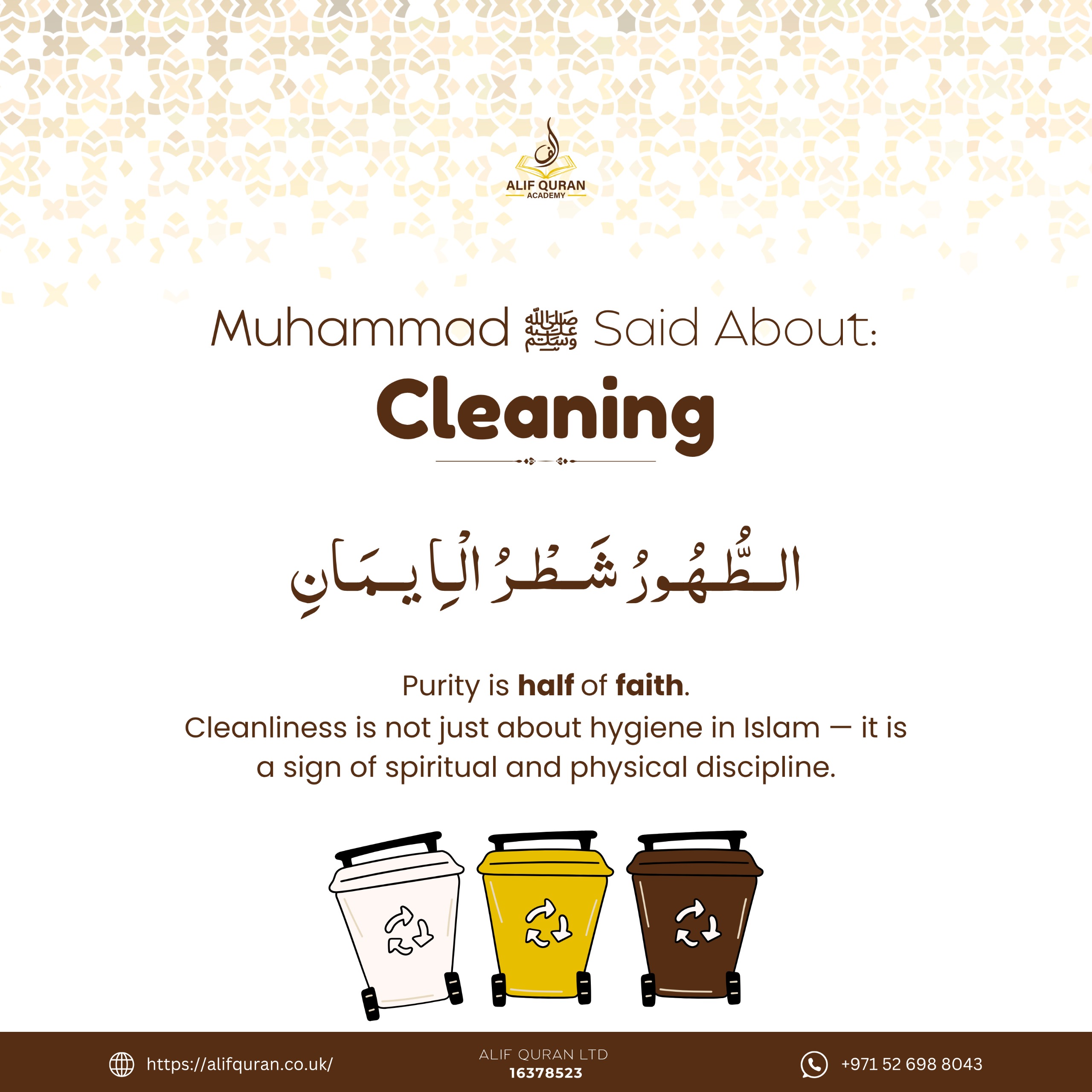What Prophet Muhammad Said About Cleaning?

What Prophet Muhammad Said About Cleaning?
Purity of Body, Mind & Environment – A Guide Inspired by the Sunnah
Why Cleanliness Matters in Islam
From ablution to grooming, Prophet Muhammad ﷺ taught that cleanliness isn’t just physical—it’s spiritual. Discover his comprehensive teachings.
1. The Hadith: “Cleanliness is Half of Faith”
The Prophet ﷺ famously said:
“Cleanliness is half of the faith.”
This hadith is found in Sahih Muslim and highlights that maintaining hygiene is deeply connected to one’s spirituality.
2. Daily Hygiene Rituals Explained
A. Ablution (Wudu) and Ghusl
A Muslim performs wudu before every prayer, washing hands, mouth, nose, face, arms, head, and feet. Ghusl, the full body bath, is required after specific situations such as marital relations or menstruation. The Sunnah ensures both physical and spiritual purity.
B. Using Water and Stones after Toilet (Istinja)
The Messenger ﷺ instructed using three stones or water to cleanse oneself after relieving oneself. This attention to detail underscores Islamic hygiene care.
C. Brushing Teeth (Miswak)
He encouraged regular use of the miswak stick, essential for oral hygiene and freshness before prayer. Though not directly cited by our searches, it forms part of hygiene hadith collections.
D. Trimming Nails, Hair, and Personal Grooming
The Prophet ﷺ advised trimming one’s nails, removing armpit hair and pubic hair, and keeping facial hair trimmed. These actions are among the Sunan al-Fitrah, natural cleanliness practices.
E. Environmental Cleanliness
A Muslim is urged to keep their surroundings clean. Prophet Muhammad ﷺ said, “Removing harmful things from the road is charity” (Sahih Bukhari), displaying civic cleanliness.
3. Health Benefits of Islamic Hygiene
- Reduces disease: Surgical cleansing after toilet use, wudu before eating and prayer, and proper bathing prevent infections.
- Oral hygiene: Using miswak reduces gum and dental issues.
- Skin and grooming: Regular washing, nail and hair trimming maintain healthy skin and discourage pests.
- Public health: Removing debris and avoiding waste buildup prevent epidemics.
4. Spiritual Impact of Cleanliness
Islam teaches linking external cleanliness with internal purity. The Prophet ﷺ stated, “Allah is clean and loves cleanliness”. Performing ghusl, wudu, and using miswak not only cleanse the body but prepare the soul for worship. Prayer in a clean state reflects sincerity before Allah.
5. Practices in Daily Life
Here are practical routines derived from these teachings:
- Maintain wudu throughout the day, especially before prayers and after waking.
- Use water or stones after toilet; avoid overuse of tissue-only methods.
- Brush teeth regularly with miswak or toothbrush.
- Perform ghusl after physical impurity or before Friday prayer.
- Trim nails, hair, and remove excess body hair every 40 days.
- Wash hands thoroughly before eating; after waking and after toilet use.
- Clean the home, remove trash, and keep public spaces tidy.
6. Wisdom Shared by Scholars
Scholars stress that wudu and ghusl purify both body and spirituality. Imam Nawawi noted that these practices aid in spiritual purification (Tazkiyah). Using stones or water after toilet prevents impurity, while trimming and grooming reflect respect for Allah’s gift of the body.
7. Real-Life Examples from the Sunnah
As narrated by Aisha (RA), ﷺ would stretch his foot into a pool or wash feet directly during ablution—never splashing unnecessarily—showing the value of conservation and dignity in hygiene acts.
He also assisted in household chores: stitching, removing dirt from clothes, and milking animals—a direct practice of cleanliness integrated into daily life.
8. FAQs
What does “Cleanliness is half of faith” mean?
Is miswak compulsory?
Can I use toilet paper instead of water?
Conclusion
Prophet Muhammad ﷺ’s teachings on cleanliness cover everything from personal rituals to public hygiene. “Cleanliness is half of faith” is more than a statement—it’s a lifestyle that enhances health, spirituality, and social responsibility. May we honor these timeless teachings and make purity part of our daily routines.



